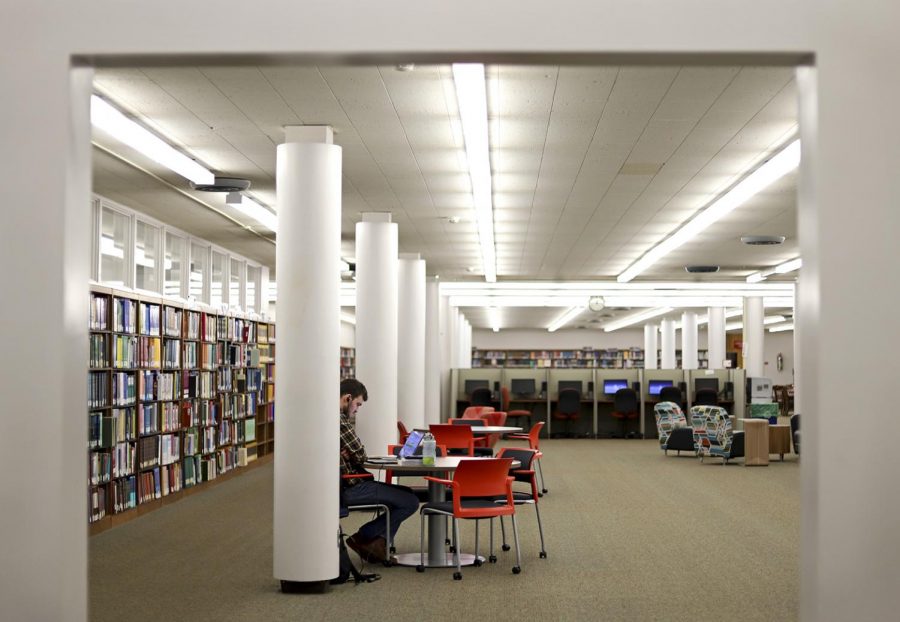WKU Commons looks to turn library into an intellectual hub for campus
January 29, 2019
While WKU students today may think of the Helm Library as a place for quiet study, WKU administration has envisioned a repurposed version of the library which encourages commuter and on-campus residents to study, dine and interact in new ways.
President Timothy Caboni’s Investiture Address in April 2018 included a plan to renovate Helm and rename it the WKU Commons, a collaborative space for students to study and eat.
Caboni said this is an opportunity to install new dining services by replacing Garrett Conference Center to create an “intellectual hub that invigorates, stimulates learning and creates a sense of community for the entire WKU family.”
WKU Commons will be a space for faculty and students to work together and for commuter students to have a central space to dine and work.
Caboni said he wants to move away from the idea of the library as just a book warehouse to make it more engaging and attract students to a central area. He also said the library is an important resource for students to graduate.
Nashville junior Arlette Alcala said this renovation is a great opportunity for students.
“I definitely agree that there should be a dining area in the Hill for students whose classes are up there,” Alcala said. “There aren’t many places where students can find a quiet place to study and have the ability to get food while doing so.”
Students had a chance to voice their opinions for WKU Commons through a survey that asked what they wanted to see with the enhancement of the library. In a previous Herald article, Caboni said he wants the project to be completed within 18 to 24 months from the time it starts.
Piper Keusch, a sophomore from Jasper, Indiana, said she is excited for the idea of a library renovation but also shared potential concerns.
“That would create more traffic in the library in a positive way, but also, people could be loud and disrupt others who are actually working in the library,” Keusch said.
In a meeting with the Herald editorial board, Brian Kuster, the vice president for Enrollment and Student Experience, emphasized the need for WKU to be student-centered.
“Our students have different needs, and we need to meet those needs,” Kuster said. “We have to look at what’s best for the students.”
Kuster said the plans imagine a hub for students to sit at a coffee shop, get food or study in a modern way.
“You can create some very dynamic space that draws faculty and staff back in the library,” Kuster said. “You won’t see stacks of books.”
WKU signed a contract with Aramark in June 2017, which Kuster said provides WKU with $35 million designated for food services renovations. Originally, the plan was to renovate Garrett Conference Center, which was first built in the 1950s and renovated in the 1960s.
Kuster said once Caboni joined WKU, the university started exploring more options. He said WKU needed to enhance food options but also wanted to create a “library of the future,” which includes more than a coffee shop. Here, Kuster said there was an opportunity to combine initiatives.
Through the contract, students who opted out of a WKU meal plan were required to pay a fee, which translates to Flex Dollars. Kuster said for commuters who pay the fee, WKU Commons will provide more available options for food and study services.
“We felt like we needed to create a place on top of the Hill more like an intellectual hub,” Kuster said.
While Panda Express is a frequent choice, Kuster said other food options at the top of the Hill are outdated and neglected. He said during conversations about WKU Commons, they are hoping to add more unique food options instead of typical chain restaurants.
By offering food options students want, Kuster said he hopes this will make top of the hill food options more profitable.
Through the planning process, Kuster said they looked at several different libraries at other universities, especially those which incorporated food options. He mentioned one the team appreciated, operated in more of a community space for interaction rather than just grabbing lunch and leaving.
“That’s really what this WKU Com- mons is going to be about, is how do we connect our students and our faculty and staff, and give them a place,” Kuster said.
Now, there are mainly long tables in Helm. Kuster said it envisions private and group study rooms added to the library. He said the project would also add several technological improvements for studying, including one-button recording rooms or spaces for presentations.
There will still be stacks in Cravens Library, but today Kuster said research is more online, and the changes will cater to this. Overall, Kuster said he hopes the changes will encourage more interaction.
Looking toward the future, Kuster said WKU Commons will be a marketable aspect to WKU to improve enrollment and retention.
News reporter Natasha Breu can be reached at 270-745-6011 and [email protected]. Follow Natasha on Twitter @nnbreu.















